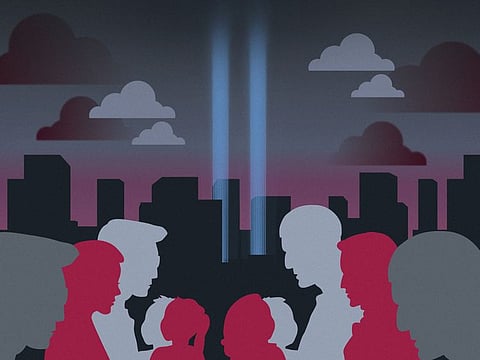Remembering 9/11: Reshaping of American politics and culture
Two decades on, it is a continuing journey of reflection, reckoning and resilience

The fateful events of Sep. 11, 2001 marked a turning point in modern history, forever altering the global landscape. More than two decades on, the impact of 9/11 still reverberates across every facet of contemporary society in the United States. It has reshaped not only the dynamics of international security.
The world witnessed an unprecedented surge in counterterrorism efforts, intelligence sharing, and international cooperation, all aimed at thwarting future acts of terror. Despite these monumental strides in security, terrorism continues to challenge our capacity to anticipate and prevent attacks.
The new enemy and the US response
The 9/11 attacks demonstrated the adaptability and innovation of terror groups. Al Qaida used sophisticated planning, training, and communication techniques that were not well understood at the time.
While al Qaeda itself has been significantly weakened since the early 2000s, its ideology and tactics continue to influence extremist groups. Some of these groups have splintered from al Qaeda or emerged independently, adopting similar strategies and goals.
Al Qaeda’s attacks exposed significant failures in information sharing and cooperation between intelligence agencies, law enforcement, and allied countries. The government responded quickly with a complete overhaul of its domestic security strategy.
Nearly six weeks after 9/11, Congress passed the Uniting and Strengthening America by Providing Appropriate Tools Required to Intercept and Obstruct Terrorism or USA PATRIOT Act, which expanded the government’s surveillance and investigative powers.
In November 2022 President George W. Bush announced that a Department of Homeland Security would be formed to “develop and coordinate the implementation of a comprehensive national strategy to secure the United States from terrorist threats or attacks.” The War on Terror prompted increased sharing of intelligence among federal, state, and local law enforcement agencies.
The formation of joint terrorism task forces (JTTFs) facilitated collaboration and information exchange, helping identify and respond to potential threats more effectively. Traditional military response was now seen as insufficient, and diplomatic, economic, intelligence, and law enforcement measures were adopted.
Aviation security worldwide saw a major overhaul after 9/11. Airports and airlines implemented measures to enhance passenger and aircraft safety, including reinforced cockpit doors, stricter passenger screening, and enhanced security protocols.
The US created the Transportation Security Administration in November 2001 as a response to the 9/11 terrorist attacks, and the agency has played a crucial role in preventing further acts of terrorism within the country.
The TSA invested in state-of-the-art security technology, including explosive detection systems for baggage screening. These technologies improved the ability to detect explosive materials and other dangerous items within checked luggage.
The 9/11 attacks also raised profound ethical and legal questions, particularly regarding the balance between national security imperatives and civil liberties.
The PATRIOT Act expanded the government’s surveillance powers by allowing law enforcement agencies to conduct wiretaps, electronic surveillance, and searches without traditional warrants or with more relaxed standards.
This raised concerns about the potential for unchecked government intrusion into the private lives of individuals. The detention of terrorism suspects at Guantanamo Bay without due process sparked debates about the rights of detainees.
Revelations of torture and harsh interrogation techniques at facilities like Abu Ghraib in Iraq provoked moral and legal inquiries into the treatment of prisoners and reshaped the discourse on ethics, law, and the responsibilities of a democracy in the face of terrorism.
A nation changed forever
The widespread insecurity instilled in much of the US population after 9/11 has had effects in the political realm. Terrorism, which was considered a marginal foreign threat before 9/11, has been a top priority for every US administration since, even if the focus has changed over time.
Some politicians have used the spectre of terrorism to amplify the perceived threat for political advantage, particularly during election campaigns. This approach can serve as a means to rally public support, discredit opponents, and bolster one’s own political standing by framing oneself as the defender of national security.
Such tactics have had a profound impact on public perceptions and policy decisions, adding complexity to the broader discourse on the relationship between terrorism, politics, and public fear.
The memory of 9/11 remains deeply ingrained in the American psyche and continues to shape public opinion and discourse on issues related to national security, immigration, and civil liberties. It also had a profound impact on popular culture, shaping the way audiences engaged with these topics.
Twenty-two years later, Sep. 11 is a “Day of Remembrance,” a time for many to remember, reflect, honour, and mourn the 2,997 people killed in one of the deadliest terrorist attacks in history.
Dr. Kristian Alexander is a Senior Fellow and the Director of International Security & Terrorism Program at TRENDS Research and Advisory
Sign up for the Daily Briefing
Get the latest news and updates straight to your inbox



